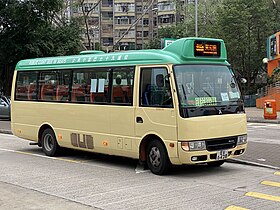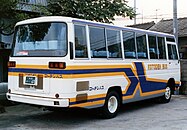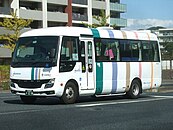Mitsubishi Fuso Rosa
| Mitsubishi Fuso Rosa | |
|---|---|
 Fuso Rosa as a Hong Kong minibus | |
| Overview | |
| Manufacturer | Mitsubishi Motors (1970–2003) MFTBC (since 2003) |
| Production | 1960–present |
| Body and chassis | |
| Class | Minibus |
| Body style | Minibus |
| Related | Mitsubishi Fuso Canter |
The Mitsubishi Fuso Rosa (Japanese: 三菱ふそう・ローザ) is a Japanese minibus based on the Mitsubishi Fuso Canter manufactured by Mitsubishi Fuso Truck and Bus Corporation. The Mitsubishi Fuso Rosa was launched in 1960 and is now in its fifth generation, known as the BE7. In Japan, Asia-Pacific, Mid-East, Africa, Jamaica and South America, its principal competitors are the Isuzu Journey, Nissan Civilian, Mazda Parkway and Toyota Coaster.
History
The Mitsubishi Rosa was launched in 1960 by the Mitsubishi Heavy Industries (formerly China-Japan Heavy Industries) and was called Mitsubishi Rosa. In 1964, three companies merged with the Mitsubishi Heavy Industries to become a new Mitsubishi Heavy Industries, and the Mitsubishi Rosa became a Mitsubishi Fuso product to replace the Fuso MB720 minibus in 1966.
First generation (1960–1973)

Mitsubishi officially launched the Rosa minibus in 1960. At that time, the factory was coded as B10 and developed from the chassis of the original Mitsubishi Jupiter T10 truck.[1] Its body style is similar to the Mercedes-Benz O 319 minibus, with a length of approximately 5.4 meters.
In the following year (1961), Mitsubishi evolved to B20 on the basis of B10, which is an extended version of B10, which ranges from 6.25 to 7 meters in length.
Second generation (1973–1986)
In 1973 Mitsubishi released the second generation, which is similar as the first generation, the main difference is the design of the front has been largely revised, and a large number of components can be shared with the Mitsubishi trucks. In the beginning, there was BC2 (short-range gasoline version), BE2 (short-range diesel version) and BH2 (long-range diesel version). In 1981, the BK2 series was introduced (long-range version with a width of 2.3 meters).
- Second generation 1974 Fuso Rosa
- Second generation 1974 Fuso Rosa rear
- Second generation B21 variant
Third generation (1986–1997)
The third generation version of the body launched in 1986 was very different from the original and second generation. The most prominent change was the newly designed body, which introduced a large number of ergonomic designs. Like the previous two generations, the third generation minibus Rosa has short (6.2 meters long) and long (6.95 meters long) versions, but both only have engines of four cylinders. As for the headlights have a round or square lamp version, some of which are equipped with command lights on the side of the vehicle. In 1990, Mitsubishi Rosa received a facelift, the distance between the two headlights was extended and the command light on the vehicle side was installed. They also offered automatic transmission, independent shock absorber and reclining seats options. It was at this time that Rosa added a four-wheel drive version for the first time.[2]
- Third generation Left Hand drive in Jordan
- Third generation factory built 4WD
- Third generation factory built 4WD
- Third generation 1986 Fuso Rosa rear
Fourth generation (1997–present)
| Fourth Generation | |
|---|---|
 2000 Mitsubishi Fuso Rosa with panoramic door | |
| Overview | |
| Manufacturer | Mitsubishi Fuso Truck and Bus Corporation |
| Also called | Bahman Pegasus (Iran)[3] |
| Production | 1997–present |
| Assembly |
|
| Body and chassis | |
| Class | Minibus |
| Body style | Single-decker minibus |
| Layout | Front-engine, rear-wheel-drive / four-wheel drive |
| Floor type | Step entrance |
| Chassis | SWB/LWB/SLWB |
| Powertrain | |
| Engine | |
| Capacity | 16–33 |
| Transmission | |
| Dimensions | |
| Length | 6,245–7,730 mm (245.9–304.3 in)[4] |
| Width | 2,010 mm (79.1 in) |
| Height | 2,735 mm (107.7 in) |
| Curb weight | 3,805–4,045 kg (8,389–8,918 lb) |
The fourth generation (BE6 series) is an improved version of the third generation. The design of the body of the car was greatly modified, and the distance between the front axle and the door was considerably reduced. In addition, the taillights are round, different from the second and third generation. There are both Automatic and Manual models available.[5] In 1998, a super long body was added to the line-up, bringing the maximum capacity of all the vehicle to 34 people. In 2002, natural gas engine were offered to the Mitsubishi Rosa. Transmac in Macau was supplied with a dual-door version.
Body types
- Short body (6.25 meters in length, 16- or 25-seater)
- Long body (7 meters in length, 16-, 23-, 25- or 28-seater)
- Super long body (7.73 meters in length, 23-, 24-, 29- or 33-seater)
- Kindergarten buses have a seating capacity of up to 39/41 (3x2 seat configuration), rear doors, auto door, automatic transmission.
- Fourth generation 2011 Fuso Rosa
- Fourth generation with dual side doors on Macau
- Fourth generation with new front, first introduced in Japan in 2018, it was also adopted by the new BE7 series Rosa in 2019
See also
References
- ^ Mitsubishi Light Bus Genealogy
- ^ Mitsubishi Fuso Rosa Bus
- ^ "Bahman Pegasus" (in Persian). Bahman. Retrieved 9 June 2023.
- ^ "ROSA 29 Seater Bus". Mitsubishi Fuso Hong Kong. Retrieved 15 July 2020.
- ^ Fuso Australia










